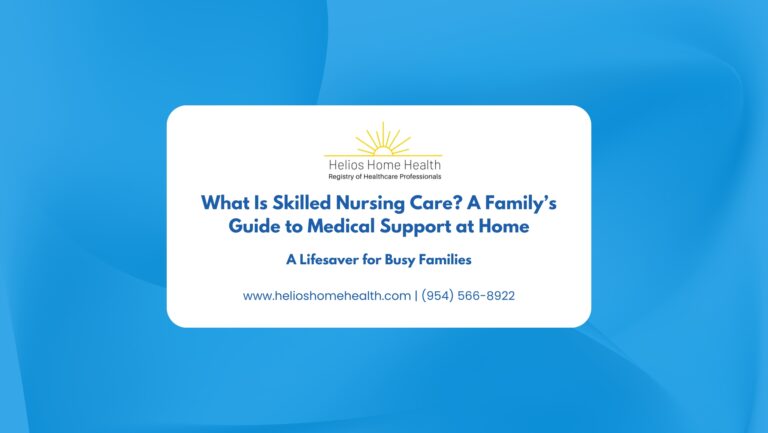
What Is Skilled Nursing Care? A Family’s Guide to Medical Support at Home
When someone you love needs medical attention after surgery, illness, or a hospital stay, you may not be ready to move them to a nursing facility. That’s where skilled nursing care at home becomes a lifesaver.
This guide explains what skilled nursing care involves, when it’s needed, and how it can support your family in the comfort of your home.
Signs Your Loved One Needs Skilled Nursing at Home
Skilled nursing care isn’t just for seniors. It supports adults of all ages who need medical services at home. You might need skilled nursing if your loved one:
- Was recently discharged from a hospital
- Has wounds that require medical dressing
- Needs IV medications or injections
- Is struggling with chronic conditions like COPD or diabetes
- Is experiencing frequent health changes
For example, after hip surgery, Maria needed IV antibiotics and wound care. Rather than returning to the hospital, her family chose home-based skilled nursing and her recovery improved within days.
Medical Services Included in Skilled Nursing Care
This type of care goes beyond basic assistance. It provides clinical-level support tailored to your loved one’s condition. Services may include:
- Medication administration and monitoring
- Wound care and dressing changes
- Injections, catheter care, or IV therapy
- Blood pressure and glucose checks
- Post-operative recovery support
- Chronic illness management
- Education for families on how to care for the patient
Each service is delivered by a licensed nurse and based on physician direction. It’s not just routine. It’s personalized care with measurable health outcomes.
For more details on what’s included, see our skilled nursing services.
How Skilled Nursing Differs from Other Home Care Services
It’s easy to confuse different types of care, but the distinction is important
Type of Service | Provider | Care Focus |
RN or LPN | Medical procedures, recovery support | |
Certified Aide | Bathing, hygiene, and mobility help | |
Companion | Supervision, errands, conversation | |
Coordinated Team | Long-term planning, health supervision | |
Specialized Caregiver | Dementia and Alzheimer’s support |
Unlike basic caregiving, skilled nursing is medically necessary and often covered by insurance.
Benefits of Home-Based Skilled Nursing Services
Families across the country are turning to home-based medical care and for good reason. Here’s what makes it a smart, compassionate choice:
- Comfortable recovery in familiar surroundings
- Less stress from hospital transfers or clinic visits
- Lower risk of infection or complications
- Ongoing health monitoring with expert oversight
- Customized care plans that adjust to changing needs
- Peace of mind for family caregivers who need backup
For instance, someone managing congestive heart failure might need weekly nurse check-ins to monitor vitals and medication. That level of attention at home helps prevent emergencies.
How to Get Started with Skilled Nursing Care at Home
If you’re exploring options, you’re probably asking:
- Where do we begin?
- How do we qualify?
- What questions should we ask the agency?
Here’s a checklist to guide your search:
✔ Are the nurses fully licensed and background-checked?
✔ Does the agency work directly with physicians and care managers?
✔ Can they support specific conditions like diabetes or stroke recovery?
✔ Is managed care coordination included?
✔ What’s the response time in case of a health change?
The right provider won’t just check boxes. They’ll build a care relationship you can count on.
Common Questions About Skilled Nursing at Home
Is this only for seniors?
No. Skilled care supports anyone who needs medical attention, regardless of age.
Will insurance cover this?
Yes. Medicare, Medicaid, and many private plans typically cover skilled nursing when ordered by a physician.
How often do nurses visit?
It depends on the care plan. Some patients need daily visits, others just once or twice a week.
Will this replace my role as a caregiver?
Not at all. Nurses support and guide you, but your presence and involvement remain essential.
Key Takeaways
Skilled nursing care delivers licensed medical support directly to the home
It’s often used after surgery, during recovery, or for chronic conditions
Services are tailored and monitored by professionals
It’s different from personal or companion care and more clinical
Families benefit from improved safety, convenience, and peace of mind
Ready to Get Medical Care at Home?
You don’t have to figure it all out alone. Whether your loved one is healing after surgery or living with a long-term illness, skilled nursing care can make life safer and easier.
Speak with a home health professional today to create a customized plan
Visit our Skilled Nursing Care page for more information and next steps

